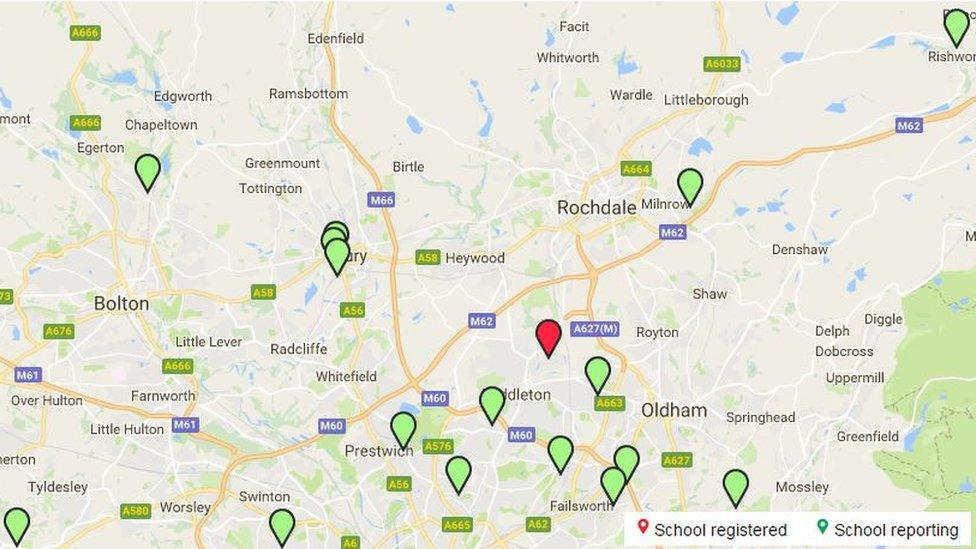BBC School Report: What I learned
- Published
Tony Hall was questioned by young reporters about Dr Who and losing Bake Off
This week, I had the utterly terrifying experience of speaking to three very smart people who want my job and are much better qualified for it than me.
Alex, 12, Yusuf, 14, and Rima, 14, interviewed Tony Hall, the director general of the BBC, as part of BBC School Report, an initiative encouraging 11- to 16-year-olds to broadcast their own news.
Each was clearly prepared, having made extensive notes.
I asked Alex what he had learned from Lord Hall.
"He talked to us about what he likes and what he doesn't like about the job," he said. Ah, excellent, what doesn't he like about the job?
"He doesn't like when people always say bad things about the BBC." What, like pretty much all the time?
Alex clarified matters with all the dexterity of a ballet dancer. "He said he enjoys the challenge of defending the BBC," he said. Smart stuff - Alex is going places.
What had been the most interesting thing he said, I asked Yusuf, while harping on about how the most interesting news is often the most surprising. I felt slightly embarrassed at trying to squeeze a news line out of three teenagers.
"He told us he learned a lot from the experience of BBC Three going online," said Yusuf. Alex concurred. Aha! Did he say which channel might be next, I asked, sniffing a scoop - BBC Four, perchance, BBC Two?
"No, he said it taught him the negatives and positives of being online only," said Yusuf, every inch the diplomat. I can see him as foreign secretary one day.
'What's the point of the BBC?'
Rima then raised one of the key topics of the conversation they had had with Lord Hall: what's the point of the BBC in the age of Netflix?
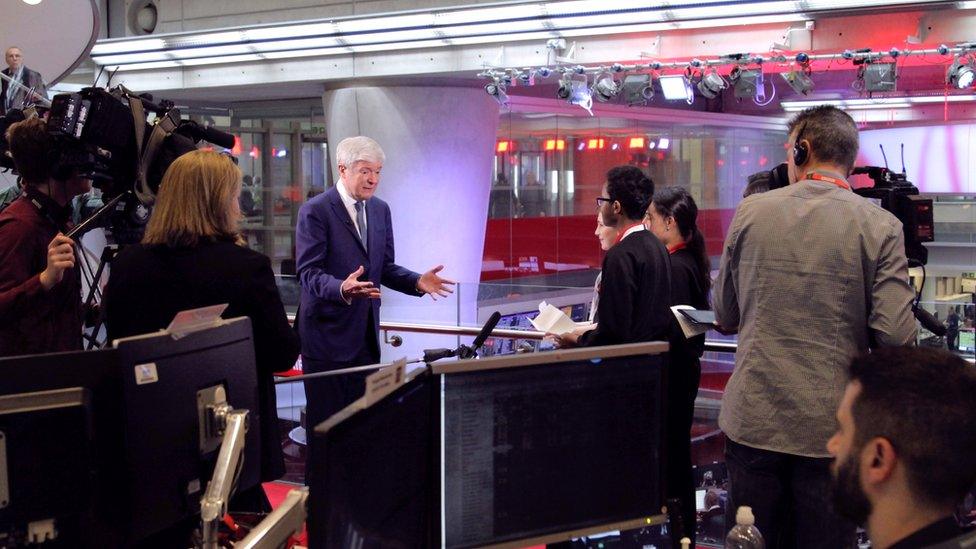
The big interview: School Reporters Alex, Rima and Yusuf stay calm under pressure in the BBC newsroom
Alex said he did not watch the BBC's Match of the Day programme but his brother watched Danger Mouse on CBBC so that was one good reason to keep the corporation going.
We then got into a discussion about the licence fee, on which Rima was hugely impressive.
She knew how much it was, and offered a stout defence of it.
"It is good value for programmes with no adverts," she said, and I couldn't help but wonder if she would have been the perfect secret weapon in the BBC's recent negotiations over charter renewal.
At this point, things got exciting, because without perhaps being aware that they were doing so, Alex, Yusuf and Rima articulated a vision of the future of broadcasting.
How does the BBC compare with Netflix, I asked Yusuf. He then genuinely produced a line that could have been straight out of the Netflix PR manual. "Well, with Netflix, it's only £6 a month and I can watch it on my phone; and with Sky [which his family also has], you just pre-record things and then watch them when you want," he said.
Rima, whose vocabulary was seriously advanced, later added: "It's easy watching things like Netflix because you can do it at your own pace and mould it around you."
She literally said that. She said you could "mould it around you".
That's when I remembered some of the wisdom I learned from a mentor earlier in my career.
Convenience is king
In my last job, I learned a huge amount at the feet of our managing director, Andy Mullins, who now works for Informa.
Mr Mullins is the genius who came up with the idea of taking the Evening Standard free, and launching i, the sister paper to the Independent - probably the two smartest and best executed ideas in recent newspaper history.
And nothing I learned from him stuck with me quite like the lesson that convenience is king.
All product development tends towards consumer convenience.
This sounds like the bleeding obvious.
But it's only when you really grasp it that you can understand how to innovate.
Alex, Yusuf and Rima not only grasp it, they live it.
The single biggest thing I learned from talking to them was that the idea of scheduling - of watching particular shows at fixed times - was literally laughable.
They want to watch what they want, how they want, when they want, where they want.
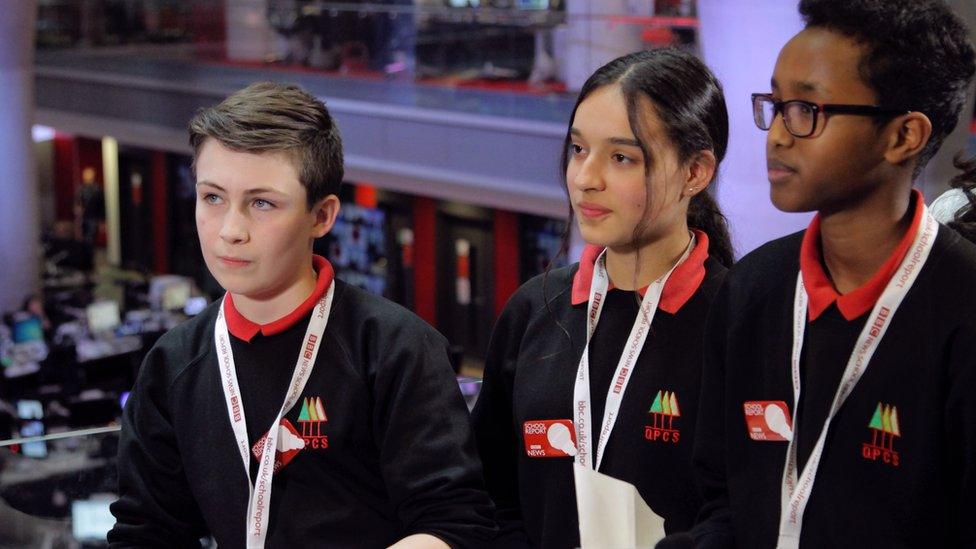
School Reporters Alex, Rima and Yusuf stay calm under pressure in the BBC newsroom
Not just want to - but now expect to.
Obviously all of us in media have known about this trend for a long time, but it was good to hear it so clearly.
Cheerily for me, it sounded like they were prepared to pay for it too.
Though maybe that's easier to say when you're a teenager who doesn't really have to earn, or part with, hard cash.
They struck me as three charming, clever, and industrious pupils, and I wish them all the very best with their studies and future careers.
Just as long as they don't kibosh mine.
- Published16 March 2017
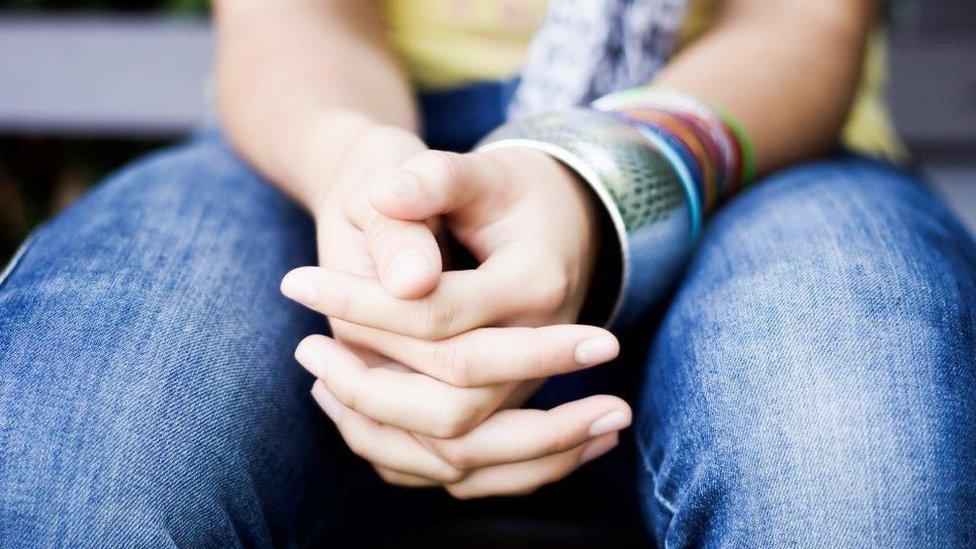
- Published15 November 2018
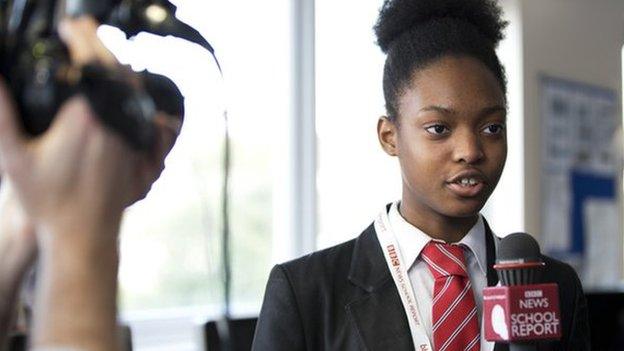
- Published8 September 2017
